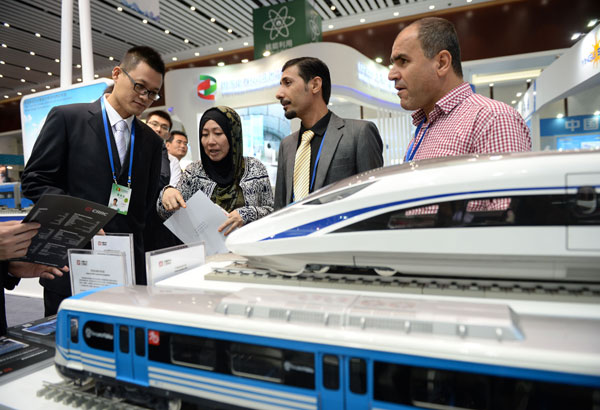Broader talent needed for Belt and Road, expert says
 0 Comment(s)
0 Comment(s) Print
Print E-mail China Daily, March 14, 2016
E-mail China Daily, March 14, 2016
A greater reserve of talent with experience and knowledge of the countries touched by the Belt and Road Initiative is needed among Chinese companies, according to Wan Jifei, a political adviser and former chairman of the China Council for the Promotion of International Trade.
 |
|
Exhibitors from Jordan learn about high-speed railway products manufactured in China during the China-Arab States Expo held in Yinchuan, Ningxia Hui autonomous region, in September. WANG PENG/XINHUA |
More than 70 countries and international organizations have expressed interest in the Silk Road Economic Belt and 21st century Maritime Silk Road initiatives, with over 30 countries having signed agreements with China to jointly build it.
But Wan said there was too much focus among the current supply of talent on English-speaking, developed countries.
"There are hundreds of thousands of Chinese students studying abroad every year. However, the majority of destinations are developed countries in Europe and the United States," he said.
In 2014, around 460,000 Chinese students went abroad to study, and close to 60 percent were headed to the US.
As a result, they have a much better understanding of the West, and their thinking has been shaped or influenced by studies of Western systems of finance, economic development, politics and culture.
"They know little about the history, society, culture and religious situations of the less-developed countries along the routes of the Belt and Road in Asia, Africa and Latin America," Wan said.
The amount of talent with a good understanding of countries along the routes needs to increase for Chinese investors to go global, according to the veteran adviser.
"It is a risky proposition for Chinese companies that have little preparation, make reckless investing decisions and invest hugely in unfamiliar countries," he said.
Wan suggested that government departments, enterprises, research institutes and universities should join hands to "build a training system for interdisciplinary, internationalized talents".
Chinese investors are hoping to introduce more high-end talent from overseas that will build their global networks by conducting in-depth surveys of destination countries, he said.
The country needs "more talent in the fields of international commerce, and science and technology cooperation", Wan said.
They are expected to have global vision, and be familiar with international rules and the investment circumstances of various markets, he added.






Go to Forum >>0 Comment(s)